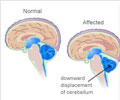J. Biol. Chem. 2020 Jan 31
Serine phosphorylation of the small phosphoprotein ICAP1 inhibits its nuclear accumulation.
Su VL, Simon B, Draheim KM, Calderwood DA
Nuclear accumulation of the small phosphoprotein integrin cytoplasmic domain-associated protein-1 (ICAP1) results in recruitment of its binding partne ...
Read More
Source: PubMed
World Neurosurg 2020 Jan 28
Transient Aphasia Following Resection of a Thalamic Cavernous Malformation:A Case Report.
Brandel MG, Lee RR, U HS
The thalamus has a demonstrated role in language, particularly through its connectivity to frontal language cortices. ...
Read More
Source: PubMed
J Clin Neurosci 2020 Jan 22
Distinguishing mimics from true hemorrhagic cavernous malformations.
Kumar S, Brinjikji W, Lanzino G, Flemming KD
Cavernous malformations (CM) are angiographically occult vascular malformations. CM appear as discrete, small lesions with mixed-signal characteristic ...
Read More
Source: PubMed
Int J Mol Sci
Cerebral Cavernous Malformation Proteins in Barrier Maintenance and Regulation.
Wei S, Li Y, Polster SP, Weber CR, Awad IA, Shen L
Cerebral cavernous malformation (CCM) is a disease characterized by mulberry shaped clusters of dilated microvessels, primarily in the central nervous ...
Read More
Source: PubMed
Surg Neurol Int
Rare case of giant pediatric cavernous angioma of the temporal lobe: A case report and review of the literature.
Hassani FD, Karekezi C, El Abbadi N
Giant cavernous malformations of the central nervous system are quite rare. They are more common in children and may be misdiagnosed as other intracra ...
Read More
Source: PubMed








